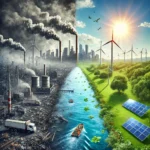In today’s world environmental pollution, global warming, rising sea levels, carbon emissions, plastic waste, etc. are highly discussed topics. In the near past, no one would consider these adverse changes in the atmosphere as seriously as they should have.
However, scientists, different groups, forums and movements of conscious people have been trying for a long to educate influential leaders, lawmakers and politicians about the possible severe consequences of climate change which is coming into being day by day. Flash floods, cyclones, unusual changes of seasons, deforestation and destruction of biodiversity, as well as the extinction of many species from the earth are heralding the advent of terrible times in the coming days.
In the pre-industrial era, the demand for human consumption was not so wide, universal and colorful as it is today. At that time most people would prefer to meet their basic needs rather than luxuries and most of those needs were met from local sources.
Nevertheless, there had been international trade of many commodities and food grains which was not as widespread as it is in today’s world. But during the post-Industrial Revolution era, innovation, production and development of new consumer goods and luxuries are pushing people toward diverse consumerism and its scope is expanding steadily. As a result, new factories are constantly being built, and inevitably, carbon emissions into the atmosphere are increasing.
The main cause of global warming is carbon emissions. The main source of that carbon is the smoke of various factories. Only 15% of the world’s population owns most factories and is responsible for carbon emissions directly or indirectly. Therefore, only a small number of multi-billionaires can play an effective role in reducing global warming.
The factories are producing on the one hand the necessities of modern life and on the other hand, the most expensive luxury goods which are consumed by very few people in the world.
The richest countries in the world, which are responsible for most of the carbon emissions, may force rich influential businessmen to adopt policies that would bring carbon emissions to a tolerable level.
This is evident that the fear of death can force people to give up many things as well as to refrain from many unnecessary pleasures, and consumption.
It is very important that environmental pollution and subsequent global warming can be reduced to a greater extent by making some fundamental changes in trade-investment policies.
Governments, consumers, and the private sector have a role to play in implementing this policy. Simultaneously governments must prioritize renewable energy as a source of energy in power plants, state-owned mills and factories. At the same time, the private sector should be encouraged or even subsidized to establish environmentally friendly sources of renewable energy.
For example, move towards commercial liberalization by removing tariffs and trade barriers on imports of all types of raw materials used in the production of environment-friendly solar panels used in solar power generation so that different countries can reduce their dependence on fossil fuels to produce and use green environment-friendly renewable energy.
To implement this tough job, it is necessary to reduce the amount of coal-based power generation to zero within the next two or three decades.
On the other hand, the real estate business has become a trillion-dollar business in today’s world. That is why those who are involved in this business are leaning towards unplanned urbanization by filling rivers, canals and wetlands, which in many ways is upsetting the balance of the natural environment. Strict measures must be taken now to protect the environment from this boundless greed of land grabbers.
All the people of this world, such as businessmen, consumers and policymakers, must remember that for the greater interests and for the sake of survival, we must give up some silly interests and come out of extreme consumerism. If any part of the body gets pierced, that part has to be cut off before it spreads to the whole part.
Similarly, in a highly loaded cargo ship that has caught in a storm then some cargos have to be dumped into the sea for the survival of the whole ship. In the same way, to save the existence of this world and sustain human civilization, we must make great concessions and accept sacrifices. Otherwise, the omnipresent danger is inevitable.
After all, a change in trade and investment policy is possible only through tough political decisions. In this regard, all the powerful countries of the world have to play a major role.
At the same time, the G20 member states pledged to reduce their fossil fuel subsidies to 2009 levels. In this case, the WTO can take the initiative to implement this commitment or play the role of mediator.
The G20 countries account for 85% of the world’s GDP and 80% of the world’s carbon emissions. That is why, from a moral and humanitarian point of view, and under international law, these countries are obliged to create the necessary funds to protect the environment and provide assistance to countries affected by climate change. But what is being done now is very insignificant compared to the damage done so far.
Research and innovation should be given utmost importance so that new types of green energy can be discovered. At the same time inventing technologies where manufacturing industries or factories rely relatively on less fuel.
The aviation industry is responsible for 2% of carbon emissions. They also need to reduce it through innovation and adaptation of fuel-saving technology. The number of vehicles powered by electricity and hydrogen needs to be increased. And in this way, the amount of carbon in the atmosphere will be greatly reduced through the advancement of new technology. At the same time, new and effective strategies for conserving electricity and energy from renewable sources need to be discovered.
Every day about 90,000 people die all over the world. A significant portion of these deaths is due to various natural disasters, as well as illnesses caused by environmental pollution and subsequent adverse climate change.
Therefore, conscious people cannot but admit that the main causes of environmental pollution are widespread industrialization and unplanned urbanization.
Increasing the use of renewable energy in factories, power plants, and households as well as controlling unlimited human consumption. In this way, we can defend against the vulnerability crises of our existence on this planet. This requires strong political will, decision making and the implementation of strict environment-friendly trade policies.
Daily OBSERVER 30-07-2022






































